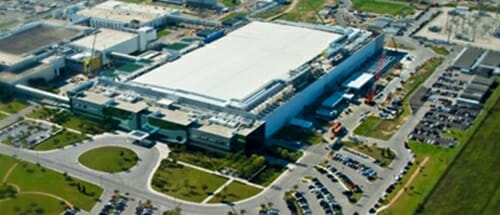
Samsung Electronics is expected to make a new investment in the Austin plant in the US in the second quarter of this year to leap to the top of the foundry market. This is because Intel, the world’s No. 1 comprehensive semiconductor company, has announced its entry into the foundry business amid the recent deepening of the supply-demand imbalance in the semiconductor market.
Intel’s CEO Pat Gelsinger said in an online briefing held on the 24th, “Intel expects the foundry market to grow to at least 100 billion dollars (about 113 trillion won) by 2025.” It will invest 23 trillion won) to establish a large-scale foundry facility. It will meet the increasing product demand and customer requirements, and provide consignment production capacity for foundry customers.”
Samsung Electronics, which is engaged in a fierce battle with TSMC with the aim of achieving the No. 1 foundry market in 2030, is closely watching the market situation in Intel’s declaration of entry into the foundry. This is because it has microprocessing technology that is more advanced than Intel in processes of less than 10 nanometers, and Intel has launched a strategy to produce semiconductors using its own foundry, so the overlapping business areas are not expected to be large.
An official in the semiconductor industry said, “Intel has declared to enter the foundry business, but as it is not going to do a pure foundry business like TSMC right away, we do not believe that a competitive structure with Samsung Electronics will be formed.” It is at the level of competing with TSMC in the advanced nanometer process, but Intel still has technology in the 10-nanometer process, so there will be no business overlap in the short term,” he predicted.


Rather, some of the industry expects that Intel’s entry into the foundry business can act as an opportunity to accelerate Samsung Electronics’ investment in the Austin plant. This is because the purpose of Intel’s entry into the foundry business is to resolve the supply-demand imbalance in the semiconductor market that has recently emerged, and Samsung Electronics is discussing tax benefits from facility investments negotiated with the Texas government.
An official from a market research firm said, “In the United States, prior to the inauguration of the Biden administration, we were discussing the federal government-level support plan (CHIPS for America ACT) to promote semiconductor production in the United States. “Intel’s entry into the foundry business seems to have nothing to do with this,” he analyzed.
He also said, “Since the semiconductor market situation is severe, Samsung Electronics is highly likely to make additional investments in Austin, the US within the second quarter.” “In the past, Samsung Electronics invested about 6 trillion won per year in the non-memory field, but this year Considering the situation, it is expected to invest about 10 trillion won.”

Some analysts say that Intel’s entry into the foundry business is difficult to shake the Yanggang system of TSMC and Samsung Electronics, which are competing for technology in a 5 nanometer high-tech process in a short time. The reason is that Intel’s entry into the foundry business is not purely a business that expands profits through consignment production of semiconductors, but that its purpose is to raise its own production capabilities.
“Intel’s announcement seems to have focused on solving microprocessing problems and securing competitiveness in manufacturing chipsets,” said Kim Yang-paeng, a research fellow at the Institute for Industry Research. It could have some negative effects on TSMC and Samsung Electronics, which were expected to win foundry orders from Intel.”
Researcher Kim, however, said, “Intel’s foundry business is likely to play a greater role as a foundry to digest its own stocks.” “Intel’s entry into the foundry business will have a limited impact on TSMC and Samsung Electronics’ Yanggang system.”
Related Articles

Why did Intel declare’entering the foundry’?

Intel enters foundry…Invests 23 trillion won to build a new factory

Intel establishes two new semiconductor factories… Advancement to the foundry

[지디팟] Short supply and demand for automotive semiconductors… Are domestic companies overcoming?
In particular, he said, “In order for Intel to increase the production of advanced processes below 5 nanometers through extreme ultraviolet (EUV) equipment, it is necessary to purchase 40-50 EUV equipment at once, but this is impossible to purchase all at once due to the current limitation of ASML EUV equipment production. He added.
Meanwhile, according to the market research firm Trend Force, Samsung Electronics ranked second in the global foundry market in the first quarter of this year with 18% share. TSMC, the number one in the market, has a market share of 56%. The production capacity of both companies is 1 million units per month for TSMC and 400,000 units per month for Samsung Electronics.
